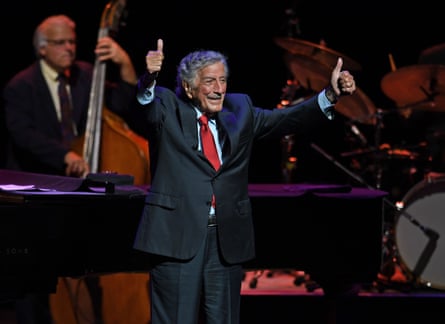Tony Bennett, the American pop and jazz singer who became the torchbearer for the Great American Songbook during a seven decade career, has died aged 96, his publicist said on Friday.
Bennett was perhaps best known for his 1962 signature song I Left My Heart in San Francisco as well as for staging an astonishing career comeback during the 80s and 90s that delivered him sustained popularity into old age. He won 19 Grammy awards, including a lifetime achievement award in 2001, and has sold more than 50m records worldwide.
In 2020, it was announced that he had been diagnosed with Alzheimer’s in 2016. He wrote on Twitter: “Life is a gift – even with Alzheimer’s.” It was revealed that while his cognitive function was impaired, he was still able to sing a whole range of his repertoire.
Bennett’s ability to perform across the genres of pop, big band and jazz won him plaudits and a conveyor belt of willing collaborators. He proved his relevance in 2014 by collaborating with Lady Gaga on the album Cheek to Cheek, which saw the pair tackle a series of jazz standards. It was a No 1 record in the US and made Bennett the oldest living act to reach the top spot, a record he already held thanks to his 2011 album Duets II.
Born Anthony Dominick Benedetto in 1926 to Italian immigrants, Bennett had an impoverished upbringing in Queens, New York. His father died when he was 10 years old, although he was already singing professionally by that point. As a teenager he became a singing waiter, earning money for the family before enrolling to study music and painting at New York’s School of Industrial Art.
Bennett was drafted into the US army in 1944 to fight in France and Germany during the final year of the second world war. It was an experience that scarred him. “It’s legalised murder,” he said during a 2013 Guardian interview.
But he continued to sing while in Germany as part of the occupying force, and in 1949, after returning home, his singing career could begin properly, first under the name Joe Bari and then as Tony Bennett.
His breakthrough came in 1951 with his first No 1, Because of You. The hits continued throughout the decade with songs such as Blue Velvet, Rags to Riches and material that looked towards the swinging sound of his childhood hero Frank Sinatra. Bennett became a teen idol, and when he married his first wife, Patricia Beech, in 1952, 2,000 female fans dressed in black to “mourn” the event outside the New York ceremony.
In 1962 he reached superstar status thanks to his version of the 1953 song I Left My Heart in San Francisco. The song won Bennett two Grammy awards and became a 20th-century pop standard.
Bennett’s style, however, was already looking outdated as the British invasion swept the US charts, and he struggled for relevance during the 1960s. The following decade saw him face a number of personal problems, including the end of his second marriage and serious drug addiction. Yet two albums recorded with pianist Bill Evans would be key to his later re-emergence as a central figure in US music.
The turning point in his life came when Bennett hired his son Danny to be his manager. Ditching the Las Vegas circuit for New York and reuniting with his early 60s pianist and musical director Ralph Sharon proved to be masterstrokes. His 1986 comeback album, The Art of Excellence, was a hit from which he never looked back. Perfectly Frank (1992) – a tribute to his idol Sinatra – topped the US Billboard’s jazz charts, while 1994’s MTV Unplugged saw Bennett win a Grammy for album of the year. Bennett became a fixture on the late-night TV circuit and collaborated with a host of artists such as kd lang, Amy Winehouse, Queen Latifah and Diana Krall, which helped maintain his relevance with younger artists. His 2006 album, Duets: An American Classic, featured appearances from Paul McCartney, Elton John and George Michael.

Singing was not Bennett’s only artistic pursuit. His paintings, produced under his birth name, are on display at the Smithsonian Institution and the Butler Institute of American Art. In 2001, he founded the Frank Sinatra School of the Arts in Queens, New York which offers qualifications in fine art, dance, vocal and instrumental music, drama and film.
A lifelong Democrat, Bennett was also a supporter of the civil rights movement who participated in the 1965 Selma to Montgomery marches and refused to perform in apartheid-era South Africa.
Bennett remained determined to perform into his later life. Shortly after his 90th birthday he told the New York Times: “I could have retired 16 years ago, but I just love what I’m doing.”
He is survived by four children: Danny and Dae from his marriage to Beech, and Joanna and Antonia from his second marriage to Sandra Grant Bennett, who he separated from in 1979. He has been married to Susan Crow, 40 years his junior, since 2007.

